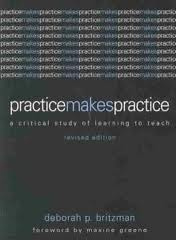Uncanny and creepy detours
I can only read Britzman in little chunks. Her phrases and sentences are so dense with meaning, so evocative of things experienced and thought, that I find myself wanting to copy out whole paragraphs or memorize phrases.
This is how I’ve read a number of the ‘big’ thinkers: Nietzsche, Charles Taylor, Jung, James Hillman; their pithily expressed thoughts seem to release something inside me that’s felt constrained and only partly accessible. It’s hard work, but quite exciting.
This morning I’ve read four pages from Practice Makes Practice.
In this short section (called ‘From socialization to subjectivity’), it’s as though Britzman has been listening to conversations I’ve had with Rachel about identity, or with Phil and Rachel about the metaphors/narratives that guide our thinking and experience, or with Simon about negotiating a path between neoliberal dictates and good pedagogy, or with Hannah and Libby about the painful business of creating a teacher-self.
It’s as though Britzman has been listening to these conversations, has seen connections between them, and is wanting to say something that helps me see these connections.
She talks, first of all, about four phases in the process of becoming a teacher.
our school and undergraduate experiences;
our teacher education;
our professional experience as a preservice teacher;
our entering the profession as a new teacher.
These four experiences are not simply times where our identities are being shaped; there’s a dialogic process happening, where the narratives we construct around what we experience create the meanings we then experience. Britzman, as usual, puts it so much more pithily.
Each of the above chronologies represents different and competing relations to power, knowledge, dependency, and negotiation, and authorizes frames of reference that effectuate discursive practices in teaching. The sense we make of each chronology depends upon the discourses we take up. (p70)
So, for Britzman, culture is not this static force that ‘enculturates’ the passive and powerless individual. It’s not something that happens to people.
Culture is where identities, desires, and investments are mobilized, constructed, and reworked. It is the site where antagonistic meanings push and pull at our sensibilities, deep investments, and relationships with others. And consequently there is not one monolithic culture that communicates unitary meanings. Circulating within and persuading any culture are an array of contesting and contradictory discourses that vie for our attention. To speak and act as if there is one monolithic culture of teachers, students, or schools is to take up a discourse that is at once authoritative and impossible. Within any given culture, there exists a multiplicity of realities – both given and possible – that form competing ideologies, discourses, and the discursive practices that are made available because of them. It is within our subjectivities that we can make sense of these competing conditions even as these competing conditions ‘condition’ our subjectivity in contradictory ways. (71)
I want to think a lot more about Britzman’s words: The sense we make of each chronology depends upon the discourses we take up.
What influences the decisions preservice teachers make about which discourses to take up or inhabit?
Obviously there are lots of them, but I wonder if we underestimate, and consequently undervalue, the role of teacher educators in influencing our students.
I wonder this partly because of the move towards reducing face-to-face time with students and increasing online teaching. As I was typing this sentence, an email came through about moves by universities to explore more actively the possibilities of distance and blended education. I’m not against the move to work out how to work well online; I’m strongly in favour, actually. But I sense that we’re making this move while at the same time letting what we know about Vygotsky’s ZPD become what we preach rather than what we practise.
Our students need to have space and time to ‘make sense of the chronologies’, but they need to do this within zones of proximal development, which means having close contact with others (teachers and other students) who can help them examine assumptions and add complexity and nuance to current unmediated discourses.
This happens when there is time and space for face-to-face conversation and the forming of real relationships. As I’ve been reading our recent assignments, I see evidence of this happening for some, but not enough, and I suspect that part of the reason is a lack of sufficient face-to-face time.
***
Britzman goes on to talk about how, especially in the third and fourth chronologies, the young teachers have to negotiate three kinds of narratives: the official, the pragmatic and the cultural. It’s in the cultural where young teachers are most actively creating their own guiding discourse, as they negotiate the challenges of the first two.
…the official story is often deconstructed by the practical story and it is this rupture that permits the construction of cultural stories. Cultural stories may concern how the student teacher ‘got over’, how her or his pedagogy or classroom routines resisted official perspectives, and moved beyond practical constraints to create a ‘free zone’ of democratic learning. Such stories need not be victorious. They can narrate as well the more painful and private moments when student teachers fall back on useless routines, become confused and anxious when things do not go as planned, or become undone by how their classroom students understand them. To study the cultural stories of student teaching, then, is to study the uncanny, the creepy detours, the uneasy alliances, and the obvious clashes between authoritative and internally persuasive discourses. (73)
I’m wanting to think more about ways in which we teacher educators can play a more effective role both during the time they're with us on our teacher education courses and in our graduates’ first years in the classroom.
I think we need to rethink ways we can be helping them to negotiate ‘the uncanny, the creepy detours, the uneasy alliances, and the obvious clashes between authoritative and internally persuasive discourses’.






